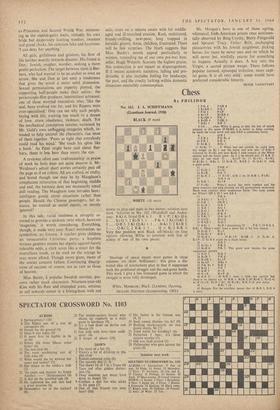Chess
By
PHIL1DOR
No. 163. L A. SCHIFFMANN (Grantham Journal, 1930) BLACK (9 men) WHITE (10 men)
wimi It) phy and mate in two moves; solution next week. Solution to No. 162 (Mansfield and Ander-
son): fl-Kt 6. threat Q-K 6. 1 . R x P; 2 Kt- Q 6.
1 Kt-Q 3; 2 Kt-B 3. 1 .. P-K 4; 2 Kt (5)-Kt 3.
1 . Q-B 5; 2 Kt (2)-Kt 3. 1 . B-Kt 7; 2 Kt-B 5. 1 . . . Q-Kt 2; 2 R-K 3. 1 . . . Q X B; 2 R-K 3. Very fine problem with Black self-blocks on four squares allowing White to interfere with line of action of one of his own pieces.
Shortage of space means most games in chess columns are short 'brilliances': this gives a dis- torted idea of tournament play in that it suppresses both the positional struggle and the end-game battle. This week I give a less truncated game in which the struggle is more fully developed.
White, MOHRLOK; Black, CLEMENS; Opening, SictuAN: (German championship, 1963.) 17 .
18 P-KKt 3 19 P-R 3 20 Kt-B 3 21 R-B 3 22 R-Q 3
23 8-K 3
24 P-Kt 3 25 QxQ 26 R-KB 1 27 B-Kt I Kt-I3 3 threatening 28 . . . P-K 5; 29 R-K 3, B.Ki 3. White's reply loses a pawn but is his best chance. 28 Kt-R 2 RxP 29 Kt-Kt 4 R-B 1 30 Kt-B 6 . . 30 Kt x P. R-OR I; 31 Kt-Kt 4, RXP; 32 Kt-B.6 might be a shade better.
30.. B-B 2 31 Kt-Kt 4 P-R 4 32 Kt-B 6 P-K S. This pawn now decides the game surprisingly quickly.
R-K. 1 P-K 6
K-ticx P t
li 3
R-R 5 P-K 7
II x13
RXP ch 41 K-R 1 loses a little less 'quickly but e.g. 41 K-R I. Kt-B 5; 42 Kt-B 3, Kt-Q 6; 7 rill; 44 R x Kt. R-K 8 ch and mates.
R-Kt 7 ch the excellent reason that 42 K-B 3, R-K 6 1 P-K 4 P-QB 4 2 Kt-KB 3 P.O 3 3 P-Q 4 P X P 4 KtxP Kt-KB 3 5 Kt-QB 3 P-K. 3 6 B-QB 4 P-QR 3 7 13-Kt 3 13-1( 2 8 0-0 . .. when White is going to play the line of attack adopted in this game (P134-135) it is better to delay castling; he needs the extra move and also 0-0-0 is sometimes better.
. . . Q-B 2 9P-114 4 P-Q Kt 4
lop-as P-K 4 11 Kt-K 2 B-Kt 2 12 Kt-Kt 3? . . . If White had not castled, he could have this knight on Kt 3 and the move and now play 12 B-Kt 3 followed by BxKt and later Kt-Q 5 with control of the White squares and the better game. As it is he should play 12 K-R 11 since he can meet 12 .. Kt xP by 13 Kt x Kt. BXKt; 14 Kt-Kt 3, B-Kt 2; 15 Kt-R 51, B-KB 3; 16 Q-Kt 4! with a good game.
12P-KR 4! 13 ki-O 5 BxKt 14 BxB P-R 5!
15 Kt-K 2 ... 15 Bxlt?, Q-R 2 eh; 16 K-R 1, PxKt.
15 . . . Q-B 4 ch 16 K-R 1 Ktxll
17 P xKt . . . White's attack has been repelled and his pawn structure and king position are left permanently weakened; Black now exploits these weaknesses finely. The weak points are White's QB 2, Q 5 and KB 5.
P-R 6 Kt-Q 2 QR-B Q-B 5 B-Q 1 Kt-B 3 R-R 4 Q-K Kt 3 KtxQ K-Q 2
33 R-Q 2 34 Kt-R 7 35 R-QB 2 36 Kt xP 37 P-K Kt 4 38 R-Q 1 39 R-K 1 40 K B 41 K-B 2? . . . there is no chance
43 R x P, Kt-11 41 . .
42 Resigns. For is mate.






































 Previous page
Previous page